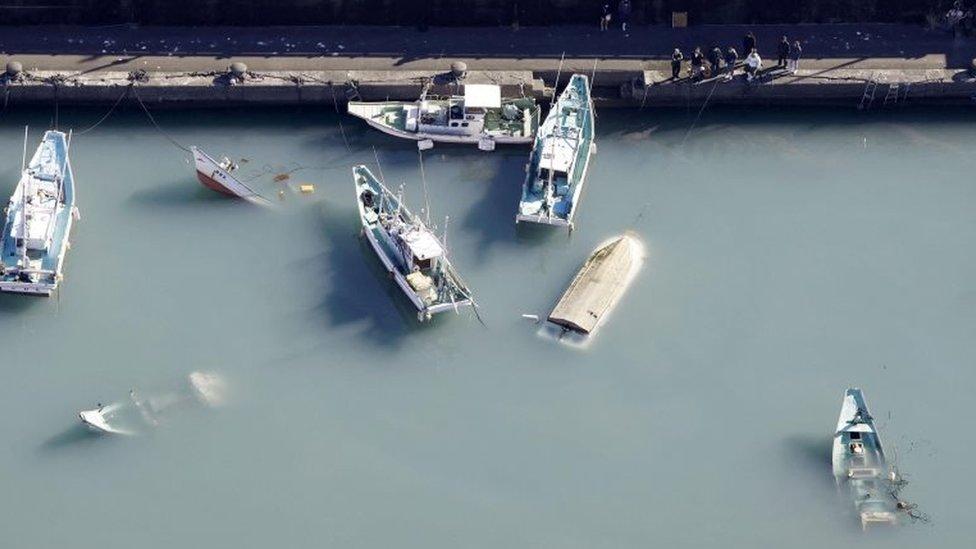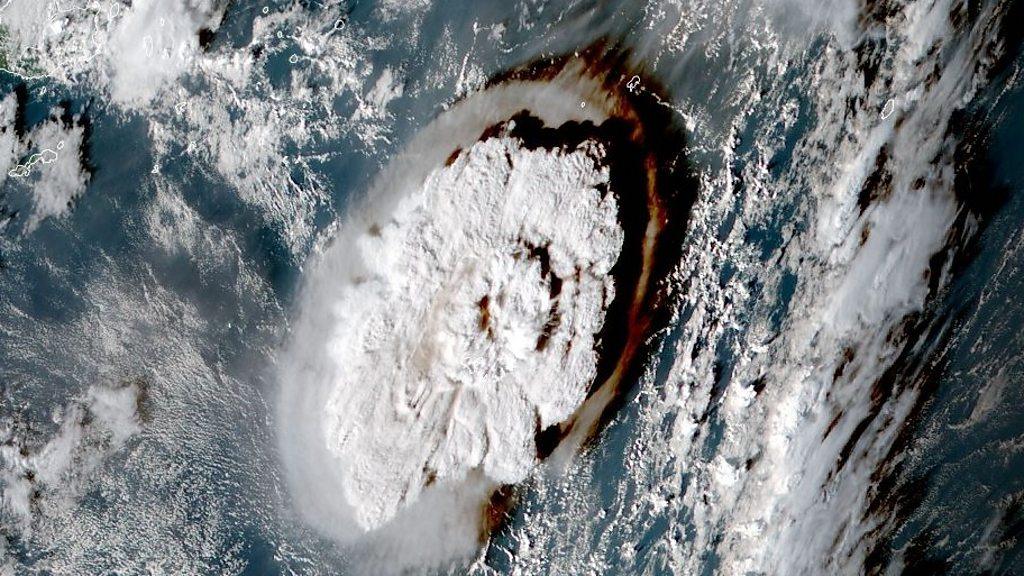Tsunami threat over after huge Pacific volcano eruption - monitor
- Published

A mini-tsunami reached as far as Japan after Saturday's eruption, damaging boats in Kochi prefecture
The threat of further tsunamis around the Pacific after Saturday's huge underwater volcano eruption near Tonga has passed, a monitoring group says.
On Sunday, the Pacific Tsunami Warning Center (PTWC) said the threat had receded but coastal areas should remain alert for strong or unusual currents.
The US and Japan earlier warned people to move away from coastal areas.
But while further tsunamis may be unlikely, there are mounting fears over how badly Tonga has been hit.
At a news conference on Sunday, New Zealand Prime Minister Jacinda Ardern said boats and large boulders had washed ashore in the island nation's capital Nuku'alofa.
"Nuku'alofa is covered in a thick film of volcanic dust - but otherwise conditions are calm and stable," she said adding that communications with the tiny Pacific nation remained very limited.
Ms Ardern said New Zealand was preparing to send an air force reconnaissance aircraft to assess the scale of the damage on Monday morning providing it is safe to do so.
So far there have been no reports of injuries or deaths in Tonga.
Watch: Satellite images capture the eruption of Hunga Tonga-Hunga Ha'apai
Also on Sunday, US Secretary of State Antony Blinken said Washington was "deeply concerned" about the potential damage and was ready to send support.
The eruption of the Hunga Tonga-Hunga Haʻapai volcano, about 65km (40 miles) north of Nuku'alofa, caused waves of more than a metre to crash into the island.
Social media footage showed water washing through a church and several homes in the city.
Allow X content?
This article contains content provided by X. We ask for your permission before anything is loaded, as they may be using cookies and other technologies. You may want to read X’s cookie policy, external and privacy policy, external before accepting. To view this content choose ‘accept and continue’.

Videos on social media showed traffic jams as people tried to flee low-lying areas by car.
One resident, Mere Taufa, said the eruption had hit as her family was preparing for dinner, and her younger brother had thought bombs were exploding nearby.
"My first instinct was to take cover under the table, I grabbed my little sister, and screamed at my parents and others in the house to do the same," New Zealand news site Stuff.co.nz quoted her as saying.
Ms Taufa said the next thing she knew, water was rushing into their home.
"You could just hear screams everywhere, people screaming for safety, for everyone to get to higher ground," she added.
The plumes of gas, smoke and ash pouring from the volcano reached 20km into the sky, Tonga Geological Services said.


The eruption of the volcano was heard across the South Pacific, and eventually as far away as the US.
In Japan, the 1.2m tsunami was recorded in the Kominato district of Amami-Oshima Island in Kagoshima Prefecture late on Saturday.
So violent was the initial eight-minute eruption that it could be heard as "loud thunder sounds" in Fiji, more than 800km away, according to officials in the capital, Suva.

Did you witness the volcano? If it is safe for you to do so email haveyoursay@bbc.co.uk with your experiences
Please include a contact number if you are willing to speak to a BBC journalist. You can also get in touch in the following ways:
WhatsApp: +44 7756 165803
Tweet: @BBC_HaveYourSay, external
Please read our terms & conditions and privacy policy
If you are reading this page and can't see the form you will need to visit the mobile version of the BBC website to submit your question or comment or you can email us at HaveYourSay@bbc.co.uk, external. Please include your name, age and location with any submission.
- Published15 January 2022
